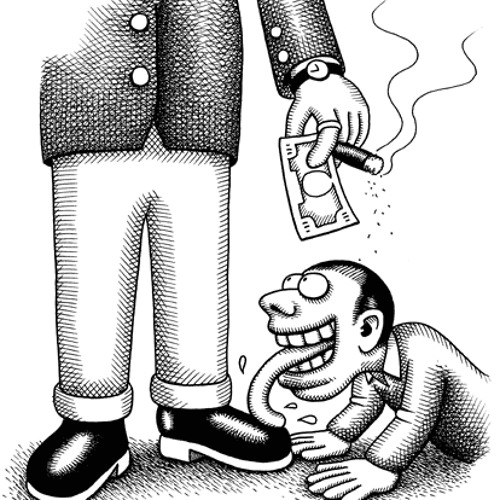Would that it were only tyrants, and not chamberlains too! How can a man possibly grow wise of a sudden, when Caesar appoints him to the charge of the privy?
How is it we straightway say, “Felicio has spoken wisely to me?” I would fain have him deposed from the dung heap, that he may seem foolish to you again.
Epaphroditus had a shoemaker, whom he sold because he was useless: then by some chance he was bought by one of Caesar's officials, and became Caesar's shoemaker.
If you could have seen how Epaphroditus honored him. “How is my good Felicio, I pray you?”
Then if someone asked us, “What is your master doing?” the answer was, “He is consulting Felicio about something.”
Epictetus was such a master of his soul, it is easy to forget how he also spent much of his life as a slave in his body.
He was “owned” by Epaphroditus, and it never ceases to amaze me how the philosopher, looking up from what most would consider the lowliest position, learned so much about the weakness of human nature by observing the behavior of his supposed betters.
I think it no accident that one of the greatest Stoics, Epictetus, was a slave, and another of the greatest Stoics, Marcus Aurelius, was an emperor. It emphasizes how worldly status is irrelevant in the face of moral dignity.
When a love of property and influence takes hold of the mind, look at how pitifully we behave! We convince ourselves we are being tough, when we are really just selling ourselves. As someone who works in the world of finance said to me the other day: “Don’t you know that bootlicking is the secret to success in business?”
The tendency to scrape and snivel in the presence of “important” people tells us not only how persuasive the bigwigs can be in duping us, but also how easily we buy into the illusion.
Furthermore, the practice of kowtowing is prevalent at all levels, not only in the hallowed halls of governments and banks. The manager of a convenience store can be just as pretentious and petty as the esteemed judge sitting at his bench.
I’m not sure if I should laugh or cry at the story of Epaphroditus and Felicio. I recall a fellow student who would ridicule me to no end for my odd convictions, and then years later, when I was somehow made the chairman of an academic department, she repeatedly sent me obsequious e-mails in the hopes of landing a job.
There is a world of difference between respecting someone for his character and browning my nose to win his favor. For the former I improve myself by following his example, while for the latter I degrade myself by becoming his doormat.

No comments:
Post a Comment